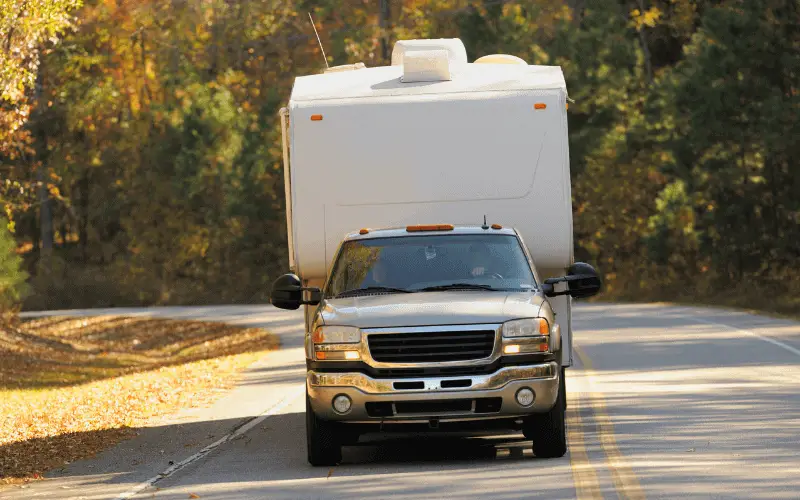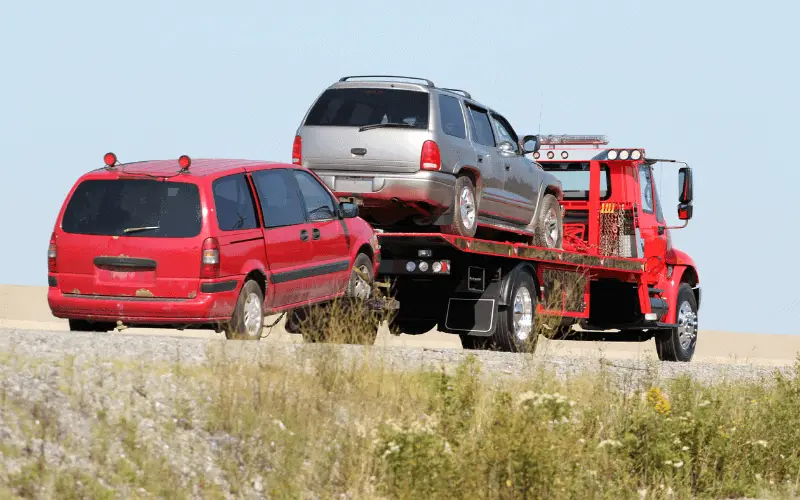Published Date: July 6, 2021
Last Updated on June 22, 2023 by Camper Front
There is no denying that any camper can wake up one morning and decide to use their SUV to tow more than its capacity.
The question is, have you EVER thought about the aftermath – like what happens if you tow over capacity? Towing over capacity will shorten your SUV or Truck’s lifespan as well as put your life and that of other road users in danger.
In this post, we will be looking at the consistent consequences of towing over capacity. Then, we will give you a preferable alternative that is SAFE and EASY to do by anyone.
So that all road-trippers can reach their final destination safely and sound. So without wasting much of your time, let’s dive right into it.
Table of Contents
What is Towing Capacity?

To get the most out of this article, you need to have a vivid picture of what towing capacity is so you can fully understand what “tow overcapacity” can do.
So Towing capacity is the maximum amount of weight ANY vehicle can tow SAFELY.
I used the word “any vehicle” because most automobiles can tow as long as you meet their specific guidelines as regards their towing capacity.
What Happens if You Tow Over Capacity?
To succinctly put: Exceeding towing capacity has a high tendency to not only shorten the life span of your vehicle but also put your life and the lives of others in jeopardy.
But how is this even possible you probably think I’m just exaggerating.
Are you aware that if you exceed what your vehicle is designed to tow, it can strain your engine and transmission, speed up brake wear, wreck your tires, and as far as warping your chassis?
Aside from reckless driving, these are mostly the leading cases of highway accident that has put SO many travelers to the ground.
Just have it at the back of your mind that whenever you tow overcapacity:
- Your vehicle will be less stable. You will find it challenging to steer and it takes longer to stop.
- The tires are bound to overheat and wear rapidly, increasing the chances of premature, dangerous, and expensive failure or blow-outs.
- The overloaded vehicle can’t accelerate as it should –making it quite difficult to overtake.
And all of these hint at casualty. So now you know towing overcapacity should not be taken lightly, what should you do?
How do you avoid this dreadful mistake that often leads to a fatal accident?
Well, first and foremost, you need to know your vehicle’s towing capacity.
Find Your Vehicle’s Towing Capacity

Know that the combined weight of your SUV plus camper and cargo should not exceed the max towing capacity.
Aside from that, we have a surefire way to find out your vehicle’s towing capacity. And why we recommend getting it from the VIN or door sticker on the truck.
What is a VIN?
VIN stands for Vehicle Identification Number. It is a unique number made up of 17 characters used to describe a vehicle.
Some people call it the VIN Number even though the N represents the word “number” –it is the same thing.
You just have to decode the VIN to discover more about your vehicle.
So how do you locate your vehicle’s VIN?
Look to the very bottom on the outside of the windshield on the driver’s side. Here you’ll find a sticker on the side of the driver’s door or the inside of the driver’s side pillar or bulkhead –either way.
Factors That Affect a Truck’s Towing Capability
- Engine Type
- Axle Ratios
- Hitch type and class
- Trailer type
- Chassis
- Transmissions
- Suspension
- Tires and load ratings
Conclusion
Now you have considered what happens if you tow overcapacity, there are certain jargons you need to get acquainted with before calculating the towing capacity and they are:
- GVWR – Gross Vehicle Weight Rating (how much weight your vehicle with passengers, fuel, and cargo can carry).
- GCWR- Gross Combined Weight Rating (the max total weight of everything combined, ie. your truck, passengers, trailer, and cargo).
- GAWR- Gross Axle Weight Rating (the amount of weight that can be placed over each axle).
- Curb Weight- This is how much your vehicle weighs without anyone in it or any cargo.
- Tongue Weight- How much weight the hitch can handle.
Note: In some owner’s manuals they may have the towing capacities in there. Whereas, some may not due to the variations in each truck build.
Read Also:

